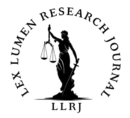Written By Savita Biyala,
Intern- Lex lumen Research Journal,
January 2025
UNDERSTANDING THE INTERSECTION OF LAW AND PSYCHOLOGY
Kurt Lewin (1935) offers the following definition of psychology: Psychology is the study of the dynamic interaction between the individual and their environment. As Kurt Lewin a German-American psychologist acknowledges, the significant role of environment factors in shaping behaviour, emphasizing the interaction between people and their surroundings. The global rate of intentional homicides in 2022 was 5.61 per 100,000 people. Whereas, in a study of crimes committed by people with serious mental disorders, 7.5 percent were directly related to symptoms of mental illness. Researchers analysed 429 crimes committed by 143 offenders with three major types of mental illness which are related to major depression, schizophrenia disorders and bipolar disorder.[1] So, we can say that psychology is directly related to law and criminal homicides. In the context of law and as per Lewin’s emphasis it is considered that internal mental conditions and the influence of outside environment affects the behaviour and actions of a person which at the end affects the legal outcomes. It is crucial to analyse the connection between rising cases of mental disorders and crimes for the society. In the case of Andrea Yates (2002, USA), she was convicted of murder initially but, her conviction was overturned on the ground that she is insane and of unsound mind. That case illustrated that how a mental disorder can impact the liability of a criminal.
PSYCHOLOGICAL DISORDERS AND THEIR IMPACT ON CRIMINAL BEHAVIOUR
As legal scholars like Ratanlal & Dhirajlal explain, psychological disorders significantly impact an individual’s ability to understand the nature of their actions, affecting their criminal liability. Psychological disorders, particularly those that affect an individual’s cognition, perception, and emotional regulation, have long been recognized as significant factors in criminal behaviour. Disorders such as schizophrenia, bipolar disorder, and borderline personality disorder often result in a diminished capacity to understand the wrongfulness of one’s actions or to conform conduct to the law. In the legal context, the concept of ‘insanity’ under Section 84 of the Indian Penal Code (IPC) acknowledges that individuals suffering from such mental illnesses may be exempt from criminal liability if they are unable to appreciate the nature of their acts due to their psychological condition.[2] Let’s look into some of the disorders
- Antisocial personality disorder (ASDP)
ASDP is a diagnosis that generally begin in childhood or early adolescence. It affects the way a certain person thinks and interact with society. These people show a lack of respect and ignore the consequences of their actions. This behaviour is fully common with a person diagnosed with ASDP empathy, but it did not meet the legal criteria for ‘insanity’.
- Schizophrenia
Schizophrenia – a serious mental disorder that affects the way a person thinks, can feel or behave generally in a society. It shows symptoms of hallucinations, delusions and disorganized thinking and behaviour. Hallucination is a condition in which a person see or hear things which are not present. This is similar to delusions which establish a firm belief into things which are not true. This people with schizophrenia are more likely to commit violent crime than among in general. Among the males with schizophrenia, 37% started a criminal career and 13% had committed first violent crime before first contact with the psychiatric hospital system.[3]
- Bipolar disorder
A disorder associated with episodes of mood swings ranging from depressive lows to manic highs. It was previously known as Manic depression and Bipolar affective disorder (BPAD)[4]. There are more chances for occurrence of crime among individuals with bipolar disorder, especially if they use abuse substances. Patients with diagnosis of bipolar disorder were 2.5 times more likely to be convicted or released for mental reasons of violent crimes compared with controls and unaffected full siblings. Although men were more violent than women, diagnosis of bipolar disorder was a more significant risk factor for female patients than for male patients.[5]
There are more mental disorders such as post-traumatic stress disorder (PTSD) & paranoid disorders which in some circumstances results into the aggressive and defensive criminal acts.
THE RIPPLE EFFECT: IMPACT ON VICTIMS AND THEIR FAMILIES
As per section 22 of Bhartiya Nyaya Sanhita 2023 “nothing is an offence which is done by a person who, at the time of doing it, by reason of unsoundness of mind, is incapable of knowing the nature of the act, or that he is doing what is either wrong or contrary of law.” According to the law, all crimes committed by individuals suffering from psychological disorders often leave a profound and long-lasting impact on the victims and their families. The focus of the legal system is mostly on the offender’s mental state and the liability arises out of their actions. But the emotional, financial, and societal consequences faced by the victims and their families are neglected. The defence of mental health creates a emotional distress among the families of the victims that the offender may not be held liable for the offence. Crime victims and their families often experience prolonged psychological prolonged psychological distress, including symptoms of anxiety, depression, and post-traumatic stress disorder, which can endure long after the crime itself. [6] Whenever the offenders with the defence of insanity are declared innocent, this creates a sense of injustice to the victims and ‘the legal system prioritizes rights of the accused over the sufferings of victims’ this idea is propagated within society. To address the following challenges, it is significant to create a better judicial system with some reforms that will support victim’s families and create a sense of security. The goal can be achieved by the enhancement of compensation schemes for the victims which will ultimately provide long-term support for the families.
THE LEGAL DILEMMA: BALANCING JUSTICE AND MENTAL HEALTH
The intersection of the crimes by individual of unsound minds and justice & law creates a complex legal dilemma about balancing the justice for the victims as well as protecting the liability of a person who is unable to understand the consequences of his actions. This challenge has profound implications for both the offenders and the victims which raises ethical questions Infront of the judicial system.
- Mental Health Defences in the Criminal Justice System
In most of the legal systems, the offender if of unsound mind at the time of the performance of crime was unable to understand the consequences of the action can not be held liable. In India, the Section of 22 of the Bhartiya Nyaya Sanhita (BNS) provides the legal framework for this defence stating that nothing is an offence which is done by a person who, at the time of doing it, by reason of unsoundness of mind, is incapable of knowing the nature of the act, or that he is doing what is either wrong or contrary of law. Even though the defence may seem straightforward, its application is way more complex and contentious as the psychological assessment vary from one expert to another. And the results are not always satisfactory or according to justice which ultimately raises questions about the criminal’s liability.
- Challenges in Proving Insanity
This is the biggest challenge in front of the judicial system to prove the mental illness of the offender at the time of crime. That is why psychiatric evaluations are conducted which determine the mental state of the accused to be held criminally liable but as human body is complex and the behaviour of mind cannot be predicted so easily the results of these evaluations are not always conclusive. For instance, the individuals who are suffering from ASPD may exhibit violent behaviour but are not considered totally insane and cannot take the defence of unsoundness as they are capable enough to know the consequences of their actions. Whereas, individuals with disorders like schizophrenia & bipolar disorders take the defence of unable to fully grasp the consequences of their actions. NGRI defence is also one of the most debatable aspects of judicial system as it is favourable for the offenders but at the same time creates challenges for public safety and is a sort of injustice towards the victim and their families.
NAVIGATING THE LEGAL MAZE: A CALL FOR REFORM IN JUSTICE
The legal system, with the aim of setting up justice in the society, often falls short while addressing the challenges by crimes committed by individuals suffering from mental disorders. The legal system prioritizing mental illness being the crucial part of the safeguard of unsounds often creates a sense of injustice towards victims.
- Gaps in Justice for Families
As the focus is on the mental state of the offender which is significant to ensure the fair trial and treatment it sidelines the requirement of justice for the victim and their families. Whenever mental health defence are invoked, the rights of the accused are also taken into consideration as the offender is unable to recognize the consequences of his action at the time of crime. But ultimately it creates imbalance.
- The Call for Legal and Social Reform
To strengthen the legal system and to create a balance between the rights of the accused and justice for the victim. Certain reforms should be maid which will focus on bridging the gap between legal accountability and social responsibility. These reforms can be –
- Victim Compensation schemes
- Mental health awareness policies
- Training legal professionals
- Justice Programs
True justice requires a system that addresses the needs of all the parties – victims, offenders, and the community – fostering accountability, healing, and a sense of closure for everyone involved.[7]
[1] American Psychological Association (APA)
[2] Ratanlal, H., & Dhirajlal, M. (2022). The Indian Penal Code (36th ed.). LexisNexis.
[3] The temporal relationship between schizophrenia and crime. Soc Psychiatry Psychiatr Epidemiol38, 347-353(2003)
[4] Gautam S, Jain A, Gautam M, Gautam A, Jagawat T (January 2019). “Clinical Practice Guidelines for Bipolar Affective Disorder (BPAD) in Children and adolescents” Indian Journal of Psychiatry. 61 (Suppl 2): 294-305
[5] Fleischman, A., Werbeloff, N., Yoffe, R., Davidson, M., & Weiser, M. (2018). 14.1 VIOLENT CRIME IN SCHIZOPHRENIA AND BIPOLAR DISORDER: A POPULATION-BASED STUDY. Schizophrenia Bulletin, 44(Suppl 1), S23. https://doi.org/10.1093/schbul/sby014.054
[6] Robert C. Davis, Arthur J. Lurigio, & Susan Herman, Victims of Crime (3rd ed., Sage Publications, 2007).
[7] Zehr,H. (2002) . The little book of restorative justice. Good Books.


